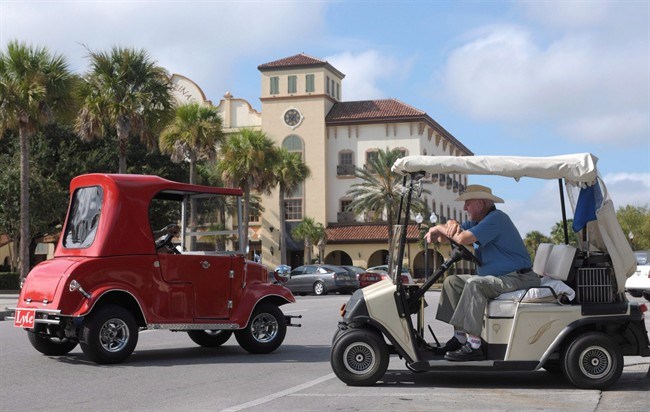B.C. seniors in two small towns will soon be able to take their golf carts from the fairway to the roadway.
Premier Christy Clark has announced a pilot project that will allow golf carts on local roads (but not major highways) in the Township of Qualicum Beach on Vancouver Island and the Village of Chase in the southern Interior. The move, which starts in September, is intended to give senior citizens another method of transportation around town to run errands.
“This change makes it easier for people, particularly seniors, to stay engaged in their community and access the services that make their lives better,” Clark said in a statement.
“By allowing these lower-emission vehicles on local streets, we are connecting British Columbians with their families and friends and improving not only their health but the quality of their lives.”
The golf carts will have to max out at 30 kilometres an hour and be equipped with seatbelts, a horn, lights, signals and a rear-view mirror.
Drivers will have to take out insurance from the municipality, hold a valid driver’s licence and only drive the cart during the day. Currently, golf carts are allowed only on roads to pass from one part of a golf course to another part of the same course.
Golf carts would give seniors another option for transportation, outside of regular vehicles and personal mobility vehicles such as motorized wheelchairs and scooters. The carts are larger, require a driver’s licence, can operate on the road and can carry a passenger and items such as groceries. Scooters don’t need a licence but are mainly confined to sidewalks.
It’s a good idea, and one that’s already been tried successfully in some communities, said Isobel Mackenzie, B.C.’s seniors advocate. Mackenzie pointed to Sun City, Arizona, which has a large elderly population, which has more than 38,000 registered golf cart users.
“I’ve seen it writ large in Arizona and it can work, does work, and fills a need for those seniors who are still able to maintain their driver’s licence but for whatever reason aren’t just that confident or comfortable in the car,” she said.
B.C.’s pilot project “has merit,” said Mackenzie.
“This is not a panacea, but I think it actually for some people will be a transportation solution.”
The province is also billing the golf carts — many of which are battery powered — as low-emission vehicles that will help reduce greenhouse-gas pollution.
The government said it has received several requests to allow golf carts on roads, and will run the pilot project in Qualicum and Chase for a year or two before deciding where it could be expanded.
Ontario tried a similar project, allowing golf carts and other low-speed vehicles onto roadways from 2006 to 2011, but abandoned the idea because of limited public interest.
Use of motorized scooters has proven controversial in some municipalities, because they can lead to crashes with pedestrians on the sidewalk or with vehicles at intersections.



